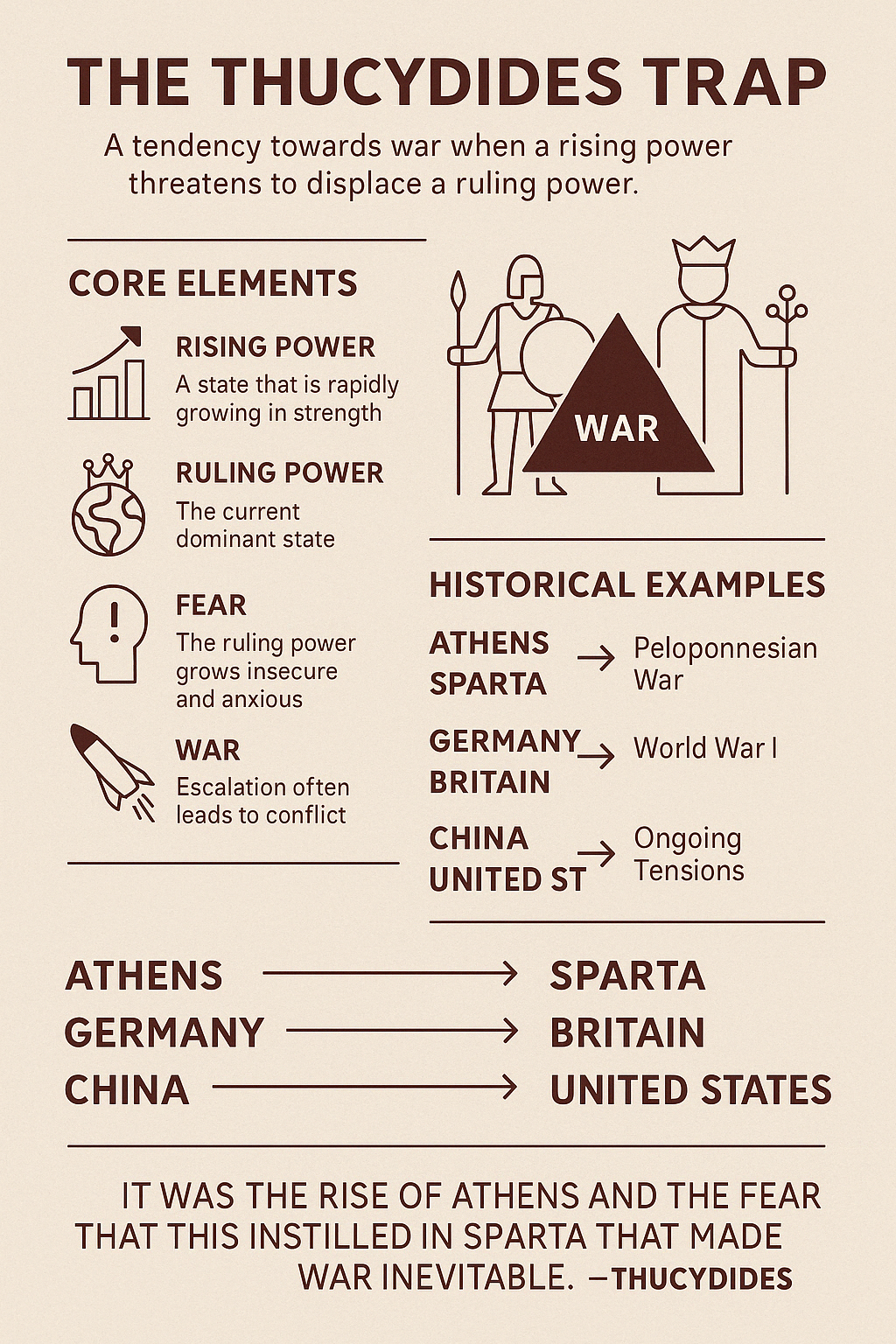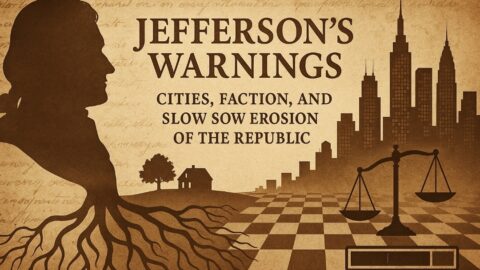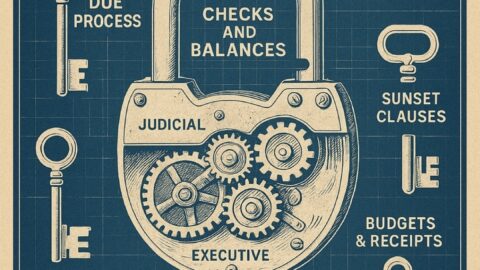The Thucydides Trap: An Inescapable Pattern of Rising and Ruling Powers
What is the Thucydides Trap?
The Thucydides Trap refers to the tendency for war to erupt when a rising power threatens to displace an existing dominant power.
It is named after Thucydides, the ancient Greek historian who chronicled the Peloponnesian War between Athens (rising power) and Sparta (established power) around 431 BC.
Thucydides’ famous insight:
“It was the rise of Athens and the fear that this instilled in Sparta that made war inevitable.”
Thus, the trap is not just the rise of a new power —
it is the fear, insecurity, and reaction of the dominant power that triggers conflict.
Core Elements of the Thucydides Trap
| Element | Description |
|---|---|
| Rising Power | A nation or empire that is rapidly growing in economic, military, and/or cultural influence. |
| Established Power | The current dominant power that sees its supremacy being challenged. |
| Fear and Insecurity | The ruling power becomes increasingly anxious, suspicious, and defensive. |
| Provocations and Escalations | Small incidents or rivalries are magnified; trust erodes. |
| War (Hot or Cold) | Open conflict (military war) or sustained hostility (cold war, economic war) often results. |
Historical Examples of the Thucydides Trap
| Rising Power | Ruling Power | Result |
|---|---|---|
| Athens | Sparta | Peloponnesian War (27 years of brutal conflict) |
| Germany | Britain (late 1800s) | World War I |
| Japan | United States (early 1900s) | Pacific War (WWII) |
| Soviet Union | United States (post-WWII) | Cold War (avoided direct war, but high tension) |
| United States | Britain (1800s) | Mostly peaceful power transition (rare exception) |
Why Does the Trap Occur?
Thucydides showed that emotion, not just strategy, drives nations into conflict:
- Fear: The ruling power fears losing its supremacy.
- Pride: Both sides see compromise as weakness.
- Mistrust: Each side interprets the other’s actions in the worst light.
- Preemptive Logic: “Better to fight now than later when the rival is even stronger.”
Thus, rational actors behave irrationally when caught in cycles of fear and pride.
Small disputes escalate, alliances are triggered, and war becomes almost inevitable — even if neither side initially desires it.
Modern Concern: China vs. United States
Today, the Thucydides Trap is often discussed regarding:
- China (rising power)
- United States (ruling power)
China’s rapid economic growth, military modernization, and global ambitions (e.g., Belt and Road Initiative, South China Sea, AI dominance) pose a direct challenge to American global leadership.
Key points of tension:
- Trade wars
- Technological rivalry (5G, AI, semiconductors)
- Military tensions in the Pacific (Taiwan, South China Sea)
- Ideological competition (democracy vs authoritarianism)
Many political analysts, including Graham Allison (who popularized the term “Thucydides Trap” in modern times), warn that unless both sides manage their fears and ambitions skillfully, a catastrophic conflict could erupt.
Allison’s research at Harvard found:
In the past 500 years, out of 16 cases where a rising power challenged a ruling power, 12 resulted in war.
Can the Trap Be Avoided?
While history shows the Thucydides Trap is real, it also shows it is not inevitable.
Possible escape mechanisms:
- Wise Leadership: Leaders must exercise extreme patience, humility, and strategic wisdom.
- Clear Communication: Avoid misunderstandings; establish “red lines” clearly.
- Mutual Adjustment: Both powers must adjust expectations (e.g., the ruling power shares influence; the rising power accepts limits).
- Strengthening Alliances and Institutions: Global organizations like the UN, WTO, and others can help mediate tensions.
- Economic Interdependence: Make war economically suicidal for both sides.
Historically, Britain and the U.S. in the late 1800s managed to peacefully transfer global influence, through diplomacy, cultural ties, and economic entanglement.
Thus, avoiding war is possible — but it requires rare wisdom.
Key Quotes to Understand the Trap
“It was the rise of Athens and the fear that this instilled in Sparta that made war inevitable.”
— Thucydides, History of the Peloponnesian War
“When a rising power threatens to displace a ruling power, the most likely outcome is war.”
— Graham Allison, Destined for War
Closing Thought: Watch the Pendulum
In the spirit of what you and I have discussed before:
- History is a pendulum swinging between sense and nonsense.
- Fear and pride can cause nations to swing into madness just as individuals do.
- Critical thinking, humility, and observation — not emotional reactions — are needed to break the cycle.
Thus, nations, like individuals, must fight daily battles against irrational fear and pride — or else they too will fall into traps as old as history itself.






